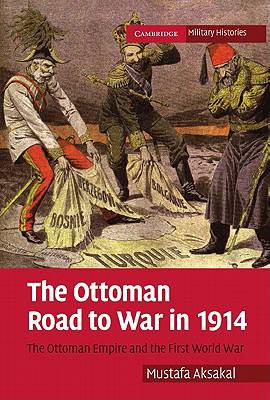
Je cadeautjes zeker op tijd in huis hebben voor de feestdagen? Kom langs in onze winkels en vind het perfecte geschenk!
- Afhalen na 1 uur in een winkel met voorraad
- Gratis thuislevering in België vanaf € 30
- Ruim aanbod met 7 miljoen producten
Je cadeautjes zeker op tijd in huis hebben voor de feestdagen? Kom langs in onze winkels en vind het perfecte geschenk!
- Afhalen na 1 uur in een winkel met voorraad
- Gratis thuislevering in België vanaf € 30
- Ruim aanbod met 7 miljoen producten
Zoeken
€ 39,95
+ 79 punten
Uitvoering
Omschrijving
Why did the Ottoman Empire enter the First World War in late October 1914, months after the war's devastations had become clear? Were its leaders 'simple-minded, ' 'below-average' individuals, as the doyen of Turkish diplomatic history has argued? Or, as others have claimed, did the Ottomans enter the war because War Minister Enver Pasha, dictating Ottoman decisions, was in thrall to the Germans and to his own expansionist dreams? Based on previously untapped Ottoman and European sources, Mustafa Aksakal's dramatic study challenges this consensus. It demonstrates that responsibility went far beyond Enver, that the road to war was paved by the demands of a politically interested public, and that the Ottoman leadership sought the German alliance as the only way out of a web of international threats and domestic insecurities, opting for an escape whose catastrophic consequences for the empire and seismic impact on the Middle East are felt even today.
Specificaties
Betrokkenen
- Auteur(s):
- Uitgeverij:
Inhoud
- Aantal bladzijden:
- 234
- Taal:
- Engels
- Reeks:
Eigenschappen
- Productcode (EAN):
- 9780521175258
- Verschijningsdatum:
- 9/12/2010
- Uitvoering:
- Paperback
- Formaat:
- Trade paperback (VS)
- Afmetingen:
- 150 mm x 226 mm
- Gewicht:
- 294 g

Alleen bij Standaard Boekhandel
+ 79 punten op je klantenkaart van Standaard Boekhandel
Beoordelingen
We publiceren alleen reviews die voldoen aan de voorwaarden voor reviews. Bekijk onze voorwaarden voor reviews.









